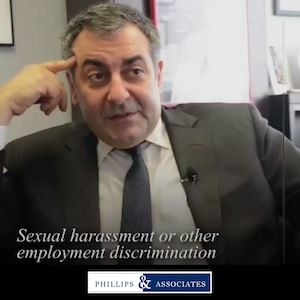
Sexual harassment on the job can be humiliating and devastating. There may or may not be economic consequences, but there are often emotional consequences. Federal, state, and local laws prohibit workplace sexual harassment. Each law, when it applies, allows an employee to sue for damages arising out of workplace sexual harassment. Phillips & Associates partner Gerry Filippatos was recently interviewed by Amadeus Frazier about the protections granted to employees who suffer from sexual harassment. If you think that you may have been subjected to sexual harassment at your job, you should talk to Mr. Filippatos or one of our other New York City sexual harassment lawyers to find out whether you have a claim.
Interview of Gerry Filippatos by Amadeus Frazier
Mr. Frazier asked Mr. Filippatos what employees can do if they are not entirely certain but believe that they may have a sexual harassment case. Mr. Filippatos replied that it can be helpful to go on record if you suspect a problem by emailing Human Resources to provide a description of what has happened and state that you think that you may be a victim of discrimination, asking for help.
He explained that going on record is important because most anti-discrimination laws have an anti-retaliation provision. Generally, an employee is employed at will in New York, which means that he or she can be fired for any reason, no reason, or a reason with which he or she does not agree. However, an employer cannot fire an employee for an unlawful reason. They cannot fire an employee in retaliation for reporting sexual harassment in good faith. This means that if you do go on record with a valid concern involving sexual harassment or another form of employment discrimination, you trigger protection from adverse action.
Grounds for Sexual Harassment Claims
Sexual harassment is prohibited under Title VII of the Civil Rights Act of 1964, the New York State Human Rights Law, and the New York City Human Rights Law. There are two types of sexual harassment. Quid pro quo sexual harassment occurs if someone in a position of power at work, such as a manager, promises to take or refrain from taking a certain employment action in exchange for sexual favors. For example, if your supervisor tells you that he will promote you if you spend the night at a hotel with him, this is quid pro quo harassment.
Hostile work environment harassment occurs when an employee experiences harm because of frequently being a recipient of unwelcome advances, physical harassment, or offensive remarks. The unwelcome advances, physical harassment, or offensive remarks must be so severe or so pervasive that they change the terms and conditions of the work environment. Even when the comments do not suggest sexual desire but are simply about one gender, they can constitute sexual harassment if they are frequent or severe enough to change the workplace. In general, trivial remarks or lighthearted teasing will not be sufficient to rise to the level of actionable hostile work environment harassment.
Title VII covers only employers with 15 employees. It is enforced by the Equal Employment Opportunity Commission. Under Title VII, damages for sexual harassment are capped based on the size of the employer.
The New York City Human Rights Law and the New York State Human Rights Law both cover smaller employers. The New York City Human Rights Law is one of the strongest civil rights laws in the country. It allows an employee to recover sexual harassment damages without caps, and it permits the possibility of recovering punitive damages.
In order to hold your employer accountable for sexual harassment, you should provide notice of the harassment to your employer. This gives the employer an opportunity to correct the situation. Furthermore, federal, state, and local laws include anti-retaliation provisions. As Mr. Filippatos explained, you trigger the anti-retaliation protection built into these laws by providing written notice of what you think in good faith was sexual harassment to your company’s HR.
Consult an Experienced Sexual Harassment Attorney
Workplace sexual harassment or retaliation after a complaint of sexual harassment can affect anyone in the workplace, regardless of gender or sexual orientation. If you believe that you were sexually harassed at your job, you should contact Phillips & Associates. Call us at (866) 229-9441 or contact us through our online form. We represent employees in sexual harassment lawsuits in Brooklyn, Manhattan, Queens, the Bronx, and Staten Island, as well as in Nassau, Suffolk, and Westchester Counties, New Jersey, and Pennsylvania.
